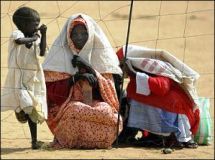Security Council to meet over Sudan’s Darfur report
NAIROBI, Feb 4, 2005 (IRIN) — The UN Security Council will not allow
perpetrators of atrocities against civilians in the western Sudanese
region of Darfur to go unpunished, according to the Council’s president.

|
|
Sudanese refugees rest near a fence at the Abu Shouk refugee camp. (AFP/file). |
The Council will address the situation in some “internationally recognised
way”, Joel W. Adechi, permanent representative of Benin and Council
president for February, told reporters on Wednesday.
Adechi was responding to the recently released report of a UN-appointed
commission of inquiry into whether or not genocide occurred in Darfur. The
commission concluded on Monday that violence in Darfur did not amount to
genocide, but that mass killings of civilians had occurred in the
strife-torn area.
“The crucial element of genocidal intent appears to be missing, at least
as far as the central government authorities are concerned,” the
five-member commission said. “There may have been genocidal acts in Darfur
and some individuals may be found guilty of genocidal intent.”
The commission identified suspected perpetrators of atrocities, including
government officials, rebels, and “foreign army officers acting in their
personal capacity”, in an annex to the report, opening the door for their
prosecution as war criminals.
While welcoming the work of the commission, US State Department spokesman
Richard Boucher said on Tuesday that the US stood by its own conclusion,
reached in September 2004, that genocide had occurred in Darfur.
“We think that the continued accumulation of facts on the ground, the
facts that are reported here in the commission’s report, support that
view, that conclusion that we reached and continue to hold,” Boucher said
in a statement.
The UN commission recommended that the Council refer its dossier on the
crimes in Darfur to the International Criminal Court (ICC), but Boucher
said the US believed that the best way to address the crimes, detailed in
the report, was to establish an ad-hoc UN and African Union tribunal.
“We think it’s important for the Security Council to consider the various
options, and we believe that having accountability for these crimes in a
tribunal that is based in Arusha, Tanzania, is the best way to ensure
accountability,” he added.
Foreign Secretary Jack Straw said Britain preferred the new Hague-based
ICC, but stressed that the key issue was consensus in the Security
Council.
Regarding the African position on the ICC and sanctions, Adechi said the
issue had not yet been discussed, but the Council would discuss the
implementation of the recommendations of the Commission.
“I think my own position on the ICC is quite well-known to you. It’s a
Court I support,” Kofi Annan, the UN Secretary-General, told reporters on
Wednesday. “The Commission recommends a referral to the ICC,” Annan noted,
adding that he hoped the Council would “come to an understanding and take
the essential action to prosecute those responsible”.
“They must be prosecuted, whichever way the Council decides to go,” Annan
said.
Adechi announced that in February, the Council would hold at least two
meetings, and possibly a third, on Sudan. The meetings would focus on both
the situation in Darfur – where violent clashes have been reported this
week – and the proposal for the establishment of a UN peace-support
mission in southern Sudan following the signing of a comprehensive peace
agreement on 9 January.
“It is too early to say what type of resolution can be expected,” Adechi
said, noting that all Council members looked at the Sudan in a
comprehensive way, and that it was impossible to consider a peacekeeping
force for the north-south agreement without taking into account the
humanitarian situation in Darfur.
The war in Darfur pits the Sudanese government troops and militias,
allegedly allied to the government, against rebels fighting to end what
they have called the state’s marginalisation of and discrimination against
the region’s inhabitants.
Tens of thousands of people have been killed in Darfur and as many as 1.85
million people are internally displaced or have fled to neighbouring Chad.
The UN has described the Darfur conflict as one of the world’s worst
humanitarian crises.
